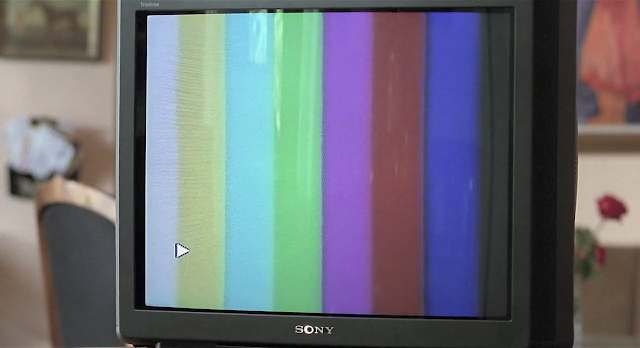I found out about Alejandro Amenábar’s 1996 feature debut Thesis on the same list of 1990s horror movies that led me to Perfect Blue. I have to say, the person who wrote that best-of list just gets me—or, more likely, they just have great taste—because it became one of my favorite movies not even a quarter of the way in.
The Spanish thriller centers on Ángela, a film student who’s studying violence in cinema for her thesis. Her search for material to analyze brings her to Chema, a scruffy classmate with an almost unhealthy fixation on anything gory and NSFL, and the extensive video collection to prove it. While watching a movie in his apartment (practically decorated like a horror museum), Ángela wonders aloud about the idea of real violence caught on tape. (Un)lucky for her, she gets her answer: The next morning, she finds her thesis adviser’s body in the viewing room of the university’s video archives, and what killed him was a heart attack caused by a snuff film hidden in the collection. The tape depicts the brutal torture and killing of Vanessa, a girl from her class who’d gone missing two years ago.
To further complicate things, Ángela meets and finds herself helplessly drawn to Bosco, a handsome and aggressive young man who claims to have known Vanessa—and who may or may not have had a hand in her disappearance. Desperate, terrified, and curious, Ángela enlists Chema to help her investigate the recorded murder, and soon uncovers a mystery that’s bigger and more sadistic than she ever imagined. And try as she might, she can’t look away.
 |
| Mmm, jelly doughnuts. |
I don’t know how easily perceptible this is about me, but I’m the kind of person who has a favorite serial killer. (It’s Jeffrey Dahmer.) Which is horrible, I know. But my interest is purely from a true-crime, psychological perspective… All right. Maybe I have more in common with Ángela than I thought. Point is, there is nothing out there quite like Thesis, with its balance of academia, snuff films, Nancy Drew-type sleuthing but better, dangerous boys, and Hitchcockian intrigue and paranoia, complete with a tense but highly subdued chase scene that turns the tables on our heroine. Nothing out there that’s as sharp or as subtle and surprisingly sensitive. There’s even a light spatter of humor throughout.
Basically everything I want to say re: this movie is already in this excellent (spoiler-heavy!) discussion on Girl Meets Freak, a super nifty horror film blog that sadly hasn’t been updated in around two years. So many great points and witty observations about things that I barely even noticed. (My only qualm is: How could they not find Chema, played by a 21-year-old Fele Martínez, easy on the eyes?! I told my cousin this and she vehemently sided with me.)
Still, there are a few more things I want to rave about.
Aside from incredibly nuanced performances from the leads (Martínez is joined by Ana Torrent and Eduardo Noriega), Thesis finds strength in layered characters with varying degrees of grace, magnetism, and moral ambiguity. There’s Ángela’s true relationship with violence, Chema’s exploitation obsession and whether or not he’s taken it a step too far, and whatever the hell Basco’s deal is. Such characterizations kept me guessing and made the twists and turns of the plot fresh instead of having them come across as stale or tiresome. The mystery itself is tightly written and very clever, with relevant clues and secret hideouts and all these great, horrifying details.The film’s two-hour runtime hardly drags, and it’s destined for multiple rapt rewatch sessions because it’s like there’s always something new to discover about it after every viewing.
 |
| Nylon Private Icon material. |
Finally, I adore how it had a very clean look to it that almost appeared to make use of a predominantly pastel (or at least light) palette. It just worked so well. I’m obsessed with the production design—from the My Own Private Idaho poster and little plants in Ángela’s pale pink room to Chema’s creepy/impressive nightmare lair with tons of horror paraphernalia and “REDRUM” spray-painted on the wall. Some literary references and callbacks made it sweet. (Really!) There’s also Ángela’s wardrobe, a fine, ultra-covetable example of the fashion of the decade. Very 1996. (Come to think of it, Chema and Basco, in their own very distinct ways, weren’t slacking in the dress-sense department, either.)
Which, all in all, adds up to the fact that I’m super glad Thesis exists, and that it was made the way it was, when it was. How I was able to live twenty-one years without it is one case I’ll never solve.

























